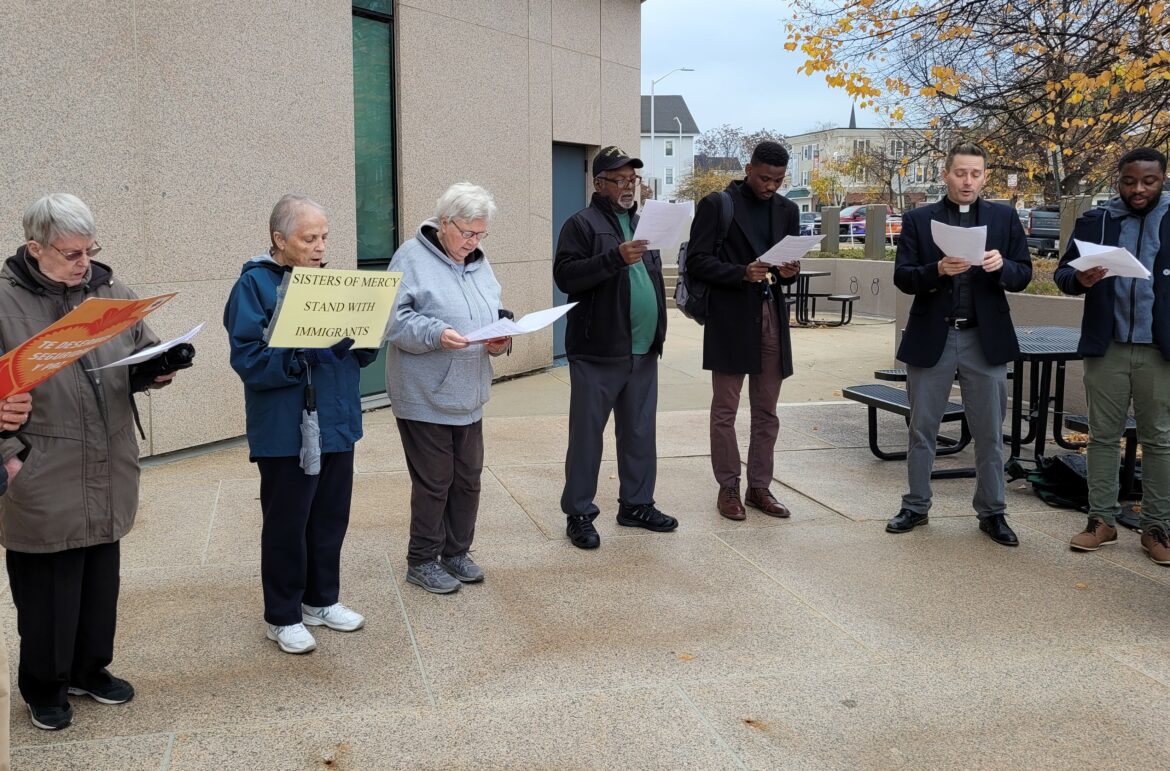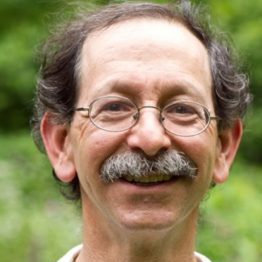
Arnie Alpert is a retired activist, organizer, and community educator long involved in movements for social and economic justice. Arnie writes an occasional column Active with the Activists for InDepthNH.org.
By Arnie Alpert, Active with the Activists
Donald Trump’s 2016 election sent shockwaves through immigrant communities from coast to coast. Members of the New Hampshire’s large Indonesian community, who had been reporting for appointments for years with officials of Immigration and Customs Enforcement (ICE), were terrified that what had been a routine “check in” meeting would instead lead to deportation.
That’s when Rev. Sandra Pontoh of the Maranatha Indonesian United Church of Christ in Madbury put out a call for support. In her humble way, she asked if members of other religious congregations might join the Indonesians for a prayerful presence in the hallways of the Norris Cotton Federal Building in Manchester, where ICE has its state office.
Eva Castillo, an immigrant from Venezuela who heads the NH Alliance of Immigrants and Refugees (NHAIR), was one of the people who showed up and kept coming back. When ICE expressed displeasure about immigrant supporters outside their office, Castillo and others began holding prayer vigils outside the building on days when they knew immigrants were scheduled for check-in appointments, usually once a month.
Held outdoors on a busy city street, “the vigils serve to call attention to the issue of immigration,” Castillo said, and “at the same time, send a message to ICE that we’re here.”
In addition to prayers and songs, they began a practice they call the “Jericho Walk,” circling the block around the building seven times in accord with the biblical story from the Book of Joshua. But instead of praying for the physical walls of the Norris Cotton Building to collapse, they prayed that the walls of injustice facing immigrants would come tumbling down.
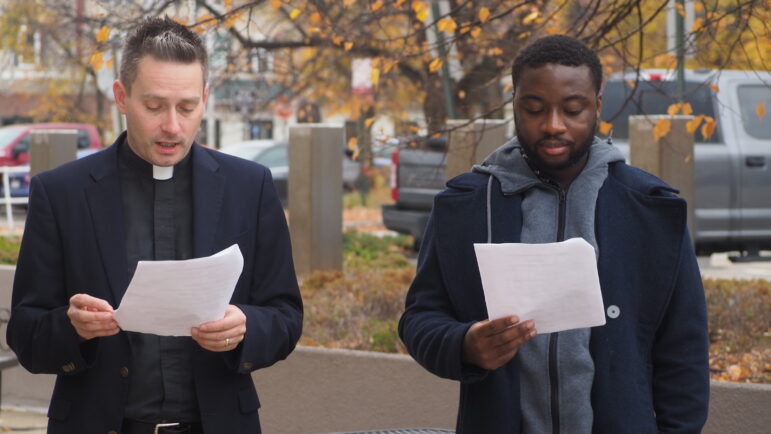
As fears of deportation grew, the Granite State Organizing Project (GSOP), an interfaith group based in Manchester, began outreach to congregations to see if any would consider offering themselves as places of sanctuary for immigrants facing deportation orders. They began scheduling their Immigrant Solidarity Network meetings in a Manchester church after the monthly prayer vigils.
Month after month, regardless of weather, immigrant solidarity activists prayed and walked and convened meetings on topics such as sanctuary, immigration reform, and support for those seeking asylum.
When COVID hit in 2020, ICE began holding its check-in meetings by phone and the vigils came to a halt. Likewise, GSOP began holding its Solidarity Network meetings over Zoom. But when ICE recently resumed scheduling in-person check-ins, vigil organizers from GSOP, NHAIR, the American Friends Service Committee, and the NH Council of Churches decided to resume prayer vigils and Jericho Walks on the first Tuesday of each month.
This month, vigilers included members of the Community Church of Durham, three Sisters of Mercy, a member of Temple Beth Abraham in Nashua, two members of Concord Friends Meeting, a representative from the local office of Congressman Chris Pappas, and several others.
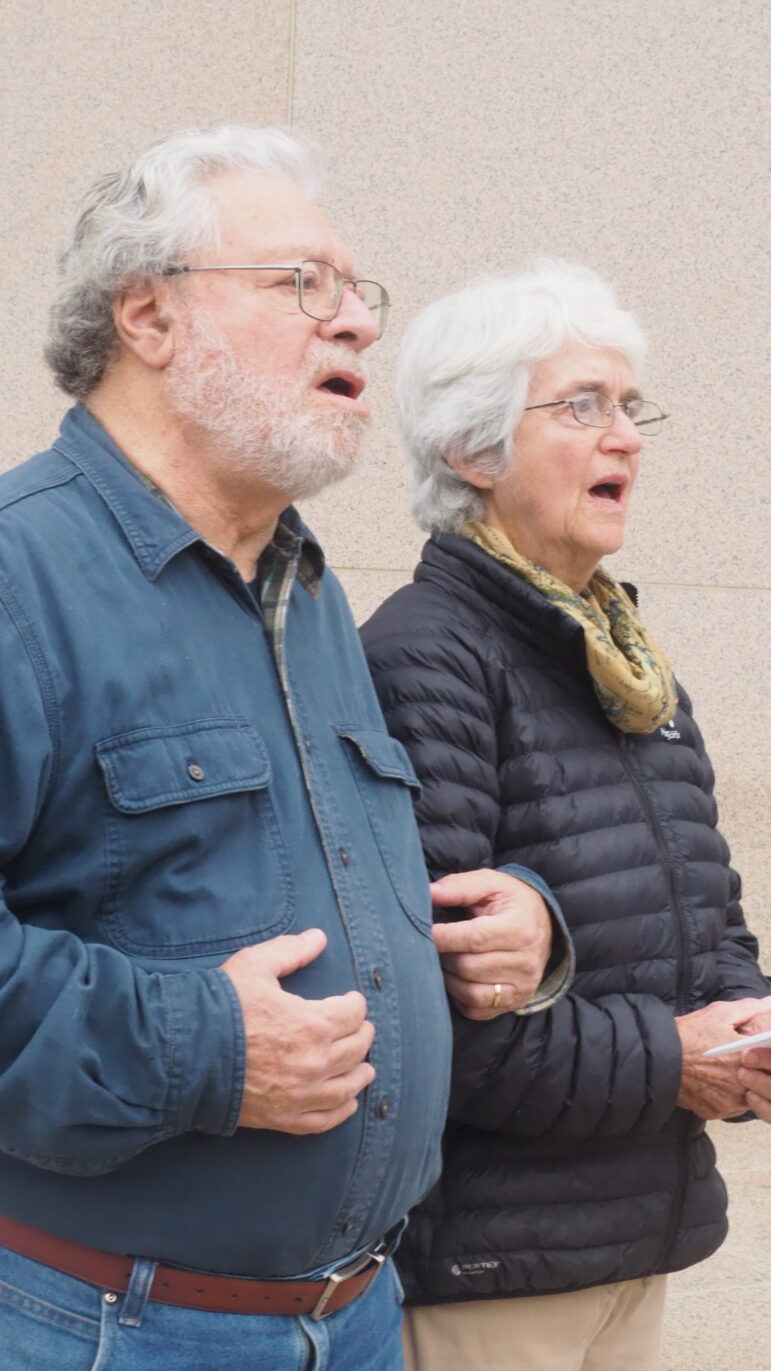
Debbie Leavitt, a member of the Immigrant Housing and Accompaniment Team at the Community Church of Durham, said she attends as often as she can. “All of us are here showing the families who have to report in that they are not alone,” she said.
Pastor Jerry Doyle of the N.E.P. House of Praise in Manchester and Rev. Jason Wells of St. Matthews Episcopal Church in Goffstown led the group in prayer. “We gather from East and West, from North and South,” Pastor Jerry read. “Crossing borders, we encounter God,” sixteen people responded.
Together they read, “We gather with the faith and the hope that one day the desert will once again bloom with life, that one day the love we carry in our hearts will matter more than the documents we carry in our hands, and that one day the walls will come tumbling down and all God’s people shall live together in peace.”
After a song, they began the Jericho Walk. “Across the country, people of faith are walking the Jericho Walk as a form of prayer for liberation for immigrants facing the threat of detention and deportation,” Pastor Jerry explained.
“We know that you are a fair God and that you have listened to our prayers. We know that in the fullness of time you will bring down these walls of injustice. We know that you will help us to soften the hearts of our government, politicians, and all people so that, very soon, we can have a new immigration law that protects the dignity of all,” the group prayed aloud.
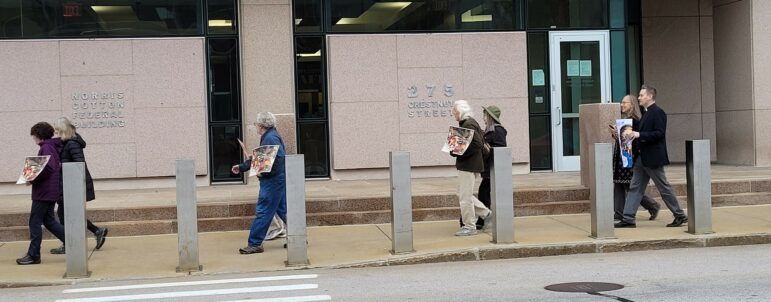
While most of the group circled the block seven times, a few stayed behind with signs and greeted at least one family that had to check in with ICE. After the Jericho Walk, the vigil closed with another short prayer and singing of “We Shall Overcome.”
A half hour later, the Solidarity Network convened at a nearby church, where discussion centered on efforts to communicate with state and federal elected officials about the changes they want to see in immigration policy.
They plan to meet again on the first Tuesday of December, first at the Norris Cotton Federal Building for the 9 AM vigil and afterward for the Solidarity Network meeting.
Looking back on several years of prayers, walks, and songs, Castillo said the vigils provided immigrants and their supporters with a chance to meet each other and “coalesce for a common cause.” Those who have to check in with ICE, always fearful of an order that could force them to leave the communities where they have settled, have reacted at first with puzzled looks, she said, but “once they know what we’re doing there, they feel grateful. They feel like somebody’s got their back.”
As for ICE officials, Castillo said the vigils tell them “that we’re still here, and that we still care, and that we’re watching what’s going on. And we will continue fighting until we achieve a fair immigration system that works for all.”
Debbie Leavitt agreed. “We believe that someday justice will occur, and our country will have a more just immigration system,” she said.
